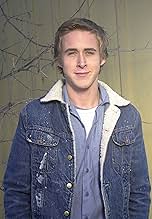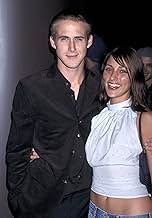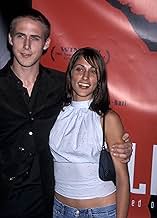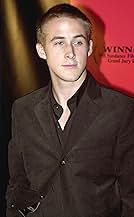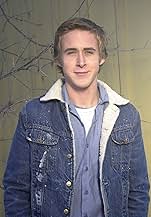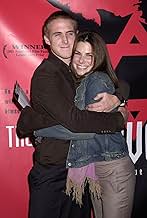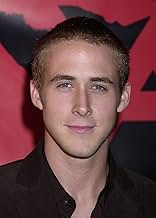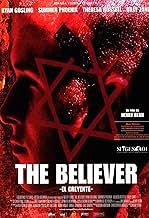A young Jewish man develops a fiercely anti-Semitic philosophy. Based on the factual story of a K.K.K. member in the 1960s who was revealed to be Jewish by a New York Times reporter.A young Jewish man develops a fiercely anti-Semitic philosophy. Based on the factual story of a K.K.K. member in the 1960s who was revealed to be Jewish by a New York Times reporter.A young Jewish man develops a fiercely anti-Semitic philosophy. Based on the factual story of a K.K.K. member in the 1960s who was revealed to be Jewish by a New York Times reporter.
- Awards
- 6 wins & 10 nominations total
- O.L.
- (as Joel Garland)
- Young Avi
- (as James G. McCaffrey)
Featured reviews
8/10
The idea of a white supremacist who's secretly Jewish is not new to me. I've long known about Frank Collin, who caused a national controversy in the 1970s when he planned to have his neo-Nazi group march in a predominantly Jewish suburb of Skokie, Illinois. It was later discovered that Collin's father was not only Jewish but a Holocaust survivor. This case is so bizarre that it leads one to assume the guy was simply insane. While there may be some truth to that assumption, it isn't a satisfactory explanation. What would possibly lead a Jew to join a group that believes in the inherent evil of all Jews? What is such a person thinking? How does such a person live with himself, rationalize his own actions?
What "The Believer" accomplishes is to go inside the head of one such person and provide a compelling, believable explanation for how such a person could exist. The film is based loosely on a 1960s incident in which a high-ranking member of the KKK was discovered to be Jewish. The movie updates the story to modern times and depicts the young man, Danny, as a skinhead rather than a Klansman. His characterization is speculative but reveals a deep understanding of human nature.
What's truly bizarre about this story is that Danny never abandons his Jewish roots entirely. After attending a neo-fascist meeting, he goes home to his family, whom he treats with respect. He even performs Jewish rituals in private. Yet he terrorizes a Jewish kid on the subway, tells his neo-Nazi buddies that he wants to assassinate a prominent Jewish diplomat, and spouts what sounds on the surface like typical white supremacist ideology. But he's not, as we might suspect, a hypocrite saying things he doesn't believe, or a two-faced lunatic. His philosophy is surprisingly coherent. Sure, he's a walking contradiction, but so are many other people who have a love-hate relationship with their religious background.
His anti-Semitic beliefs all revolve around a single idea: he thinks Jews are too weak and passive. Sometimes he adopts a macho outlook, since he doesn't want to be associated with a people stereotyped as brainy intellectuals. On a deeper level, he dislikes the persecution theme in Jewish history and culture. But is this theme a sign of weakness or strength? Danny isn't sure. He eventually decides that Jews gain strength from their persecution; they seem to grow stronger the worse they're treated, and the biggest threat to their survival is not those who want to destroy them but those who don't care. This is a far more Jewish idea than an anti-Semitic one. Several Jewish holidays, including Passover, Purim, and Chanukah, commemorate events where Jews grew strong after periods of persecution. Many Jews today believe that assimilation into the culture is a greater danger than genocide, because it could signal the disappearance of Jews as a distinct people. As Irving Kristol once remarked, "The problem is that they don't want to persecute us, they want to marry us."
The implication is that Danny actually admires Judaism, and that his anti-Semitism is his own warped way of affirming his Jewish identity in a world where, he fears, Jews are increasingly seen as irrelevant--not loved or hated but simply ignored. His ambivalent feelings escalate as the movie progresses. When he has his neo-Nazi buddies deface a synagogue, he can't bring himself to damage the Torah scroll, and he secretly takes it home with him. His intimate knowledge of Jewish beliefs and practices looks strange to his fellow skinheads, to say the least. He tells them that he studies these things in order to know the enemy, pointing out that Eichmann did the same thing. Do they buy this explanation? Apparently they do, but Danny's girlfriend is a little smarter than that, and she finds herself strangely drawn to the religion he's running away from.
Like "American History X," this movie contains disturbing scenes where the protagonist articulately expresses his bigoted ideas. There are other intelligent characters who argue back, but not everything he spouts gets answered, so I can understand why this movie makes some viewers uncomfortable. In one particularly distasteful scene, Danny mocks Holocaust survivors, and while they do answer him eloquently for the most part, his raising of the old "sheep to the slaughter" canard is left open.
Nevertheless, this a powerful and compelling film, with a lead performance by Ryan Gosling that manages to rival Ed Norton's Oscar-nominated performance in "American History X." We see early on that Danny is capable of doing appalling things, but his moral conflicts are then presented so persuasively that we cannot help but empathize with him. The climax is painfully ambiguous. Those who are looking for easy answers may want to skip this film. But they will be missing out on what is easily the most authentic and profound exploration of Jewish self-hatred ever portrayed on screen.
In The Believer, Gosling plays the young fascist who really seems to believe the antisemitic vitrol he spews. His skinhead punk is just as scary, believable and *common* as Edward Norton's in American History X -- with the added layer of being from an Orthodox background. He has apparently convinced those around him that his fascination with all things Judaic is only an effort to "know his enemy thoroughly" -- nothing more.
Gosling is nothing short of astounding in this role. He richly deserves all the honors bestowed upon him. If he continues to only get roles like Murder by Numbers, it will be a waste of a wonderful natural resource, kind of like strip mining in Yellowstone.
'The Believer' is the story of a young Jewish boy in today's America. Raised in a religious environment he is asking questions that are not unusual for a young Jewish person two or three generations after the Holocaut. Where was God during the Holocaust, and why did the Jewish people did so little to resist their oppressors? He is obviously giving the wrong answers, and not only loses his faith, but falls into the trap of self-hate, becoming a neo-Nazi and a Jew-hater, a self-hater in other words.
There are many things that can be said and discussed around this theme. The character may seem paradoxical, but it is not impossible. The fact that the story is loosely inspired by a true character is not that relevant, what is important is that we can believe the motivations of the character and understand his evolution. Certainly a film to watch and think about.
Along the way, Danny meets up with Lina and Curtis played graciously by Theresa Russell and Billy Zane who want to recruit Danny and use his persuasive talents to advance their cause as fascists. It is in his first meeting with this couple that Danny also meets Carla (Summer Pheonix), a confused young girl who eventually befriends Danny and soon begins her quest to best understand the Jews through their language and traditions.
In a later scene, Danny finds himself at a white supresmist training camp and meets other skinheads with the same hatred and desire to rid themselves of the Jewish population. Danny befriends the group and garnishes their respect with his fighting tactics, and on one fateful night, the group land themselves in jail after initiating a fight with two blacks on the street.
It is here that the most disturbing and challenging scene of the movie takes place where the group is forced by the courts to enter counselling for their crime. This counselling would include Jews who survived the holocust who tell their story to the unappreciated skinhead audience. While the others argue that the Holocost never occurred, Danny is haunted by the story of an elderly man who tells of a German Soldier who stabbed and killed his son with a bayonette during World War II.
This then leads Danny down two separate paths. On one side, he is a race hating monger, who begins to build bombs for the purpose of blowing up a synagogue. The other, a conflicted man of the Judaism faith who teaches Hebrew to his girlfriend and still practices the basics of the religion (don't light the candles at Yom Kippur before eating).
Director/writer Henry Bean does a masterful job of keeping the pace of the movie going, while not being preachy or dumbing down to the audience. The director crafts the film and does not shy away from religious interpretations (why can Jews have cheese with meat, but they can have chicken with milk), without giving us his version of the answers. Dannys scene with the reporter from the New York Times is both honest and gripping in its language and its portrayal of a man trying to justify his racist views.
Portrayed as an articulate and intelligent youth, Ryan Gosling sparkles on the screen and gives a commanding presence that is award winning material. He reveals the character to be someone of higher intelligence who hates his religion because he just can't understand all its principles. When Danny is first confronted with an opportunity to kill a Jew, he can't bring himself to promote the results that he preaches.
In short, the movie has powerful moments, great acting and tells an unbelievable story of one man's quest to understand the world he was brought up in. B+
Did you know
- TriviaDue to the film's low budget, the crew could not afford permits and many scenes had to be shot quickly.
- GoofsIn the final synagogue segment, while the congregation is singing "Aveenu Malchenu," they keep changing keys from shot to shot, up a half-step and down a half-step and back up again, indicating a string of takes edited together.
- Quotes
Daniel Balint: Let me put it this way: Who wants to destroy the Jews? Who wants to grind their bones into the dust? And who wants to see them rise again? Wealthier, more successful, powerful, cultured, more intelligent than ever? Then you know what we have to do? We have to love 'em. What? Did he say ''Love the Jews''? It's strange, I know. But with these people, nothing is simple. The Jew says all he wants is to be left alone to study his Torah... do a little business... fornicate with his oversexed wife,but it's not true. He wants to be hated. He longs for our scorn. He clings to it, as if it were the very core of his being. If Hitler had not existed, the Jews would've invented him. For without such hatred, the so-called Chosen People would vanish from the earth. And this reveals a terrible truth and the crux of our problem as Nazis. The worse the Jews are treated, the stronger they become. Egyptian slavery made them a nation. The pogroms hardened them. Auschwitz gave birth to the state of Israel. Suffering, it seems, is the very crucible of their genius. So, if the Jews are,as one of their own has said... a people who will not take ''yes'' for an answer... let us say ''yes'' to them. They thrive on opposition. Let us cease to oppose them. The only way to annihilate this insidious people once and for all... is to open our arms, invite them into our homes... and embrace them. Only then will they vanish into assimilation, normality and love. But we cannot pretend. The Jew is nothing if not clever. He will see through hypocrisy and condescension. To destroy him, we must love him sincerely. If the Jews are strengthened by hate, wouldn't this... destruction that you speak of, whether it's by love or any other means... wouldn't that make them more powerful than they are already? Yes. lnfinitely more. They would become as God. It's the Jews' destiny to be annihilated so they can be deified. Jesus understood this perfectly. And look what was accomplished there with the death of just one enlightened Jew. Imagine what would happen if we killed them all."
- How long is The Believer?Powered by Alexa
Details
Box office
- Budget
- $1,500,000 (estimated)
- Gross US & Canada
- $416,925
- Opening weekend US & Canada
- $26,263
- May 19, 2002
- Gross worldwide
- $1,309,316
- Runtime1 hour 38 minutes
- Color
- Sound mix
- Aspect ratio
- 1.66 : 1
Contribute to this page








